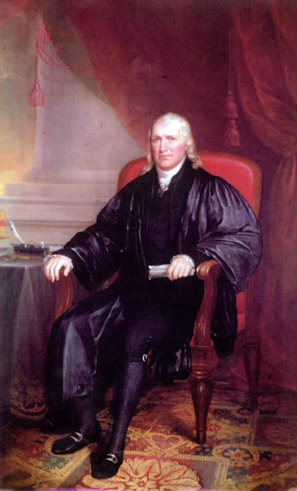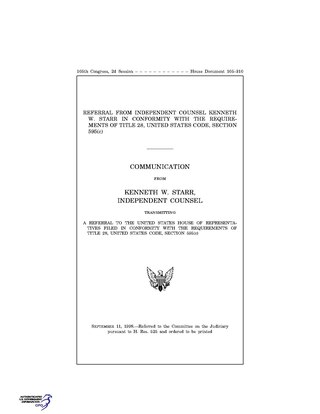Related Research Articles

Article Three of the United States Constitution establishes the judicial branch of the U.S. federal government. Under Article Three, the judicial branch consists of the Supreme Court of the United States, as well as lower courts created by Congress. Article Three empowers the courts to handle cases or controversies arising under federal law, as well as other enumerated areas. Article Three also defines treason.

Samuel Chase was a Founding Father of the United States, signer of the Continental Association and United States Declaration of Independence as a representative of Maryland, and Associate Justice of the United States Supreme Court. In 1804, Chase was impeached by the House of Representatives on grounds of letting his partisan leanings affect his court decisions, but was acquitted the following year by the Senate and remained in office. He is the only United States Supreme Court Justice to have ever been impeached.

The Starr Report, officially the Referral from Independent Counsel Kenneth W. Starr in Conformity with the Requirement of Title 28, United States Code, Section 595(c), is a United States federal government report by Independent Counsel Ken Starr concerning his investigation of President Bill Clinton. Delivered to the United States Congress on September 9, 1998, the allegations in the report led to the impeachment of Bill Clinton and the five-year suspension of Clinton's law license.
Executive privilege is the right of the president of the United States and other members of the executive branch to maintain confidential communications under certain circumstances within the executive branch and to resist some subpoenas and other oversight by the legislative and judicial branches of government in pursuit of particular information or personnel relating to those confidential communications. The right comes into effect when revealing the information would impair governmental functions. Neither executive privilege nor the oversight power of Congress is explicitly mentioned in the United States Constitution. However, the Supreme Court of the United States has ruled that executive privilege and congressional oversight each are a consequence of the doctrine of the separation of powers, derived from the supremacy of each branch in its area of constitutional activity.

Harry Eugene Claiborne was a United States district judge of the United States District Court for the District of Nevada from 1978 until his impeachment and removal in 1986. Appointed by President Jimmy Carter in 1978, Claiborne was only the fifth person in United States history to be removed from office through impeachment by the United States Congress and the first since Halsted Ritter in 1936.

Bill Clinton, the 42nd president of the United States, was impeached by the United States House of Representatives of the 105th United States Congress on December 19, 1998, for "high crimes and misdemeanors". The House adopted two articles of impeachment against Clinton, with the specific charges against Clinton being lying under oath and obstruction of justice. Two other articles had been considered but were rejected by the House vote.

Jonathan Turley is an American attorney, legal scholar, writer, commentator, and legal analyst in broadcast and print journalism. A professor at George Washington University Law School, he has testified in United States congressional proceedings about constitutional and statutory issues. He has also testified in multiple impeachment hearings and removal trials in Congress, including the impeachment of President Bill Clinton and both the first and second impeachments of President Donald Trump. Turley is a First Amendment advocate and writes frequently on free speech restrictions in the private and public sectors. Turley is a Fox News contributor. He is the author of The Indispensable Right: Free Speech in the Age of Rage.
Nicholas Quinn Rosenkranz is an American constitutional law scholar, professor, and Broadway producer. He writes and teaches in the fields of constitutional law, statutory interpretation, and federal jurisdiction. He is the son of billionaire investor and philanthropist Robert Rosenkranz.

The impeachment trial of Bill Clinton, the 42nd president of the United States, began in the U.S. Senate on January 7, 1999, and concluded with his acquittal on February 12. After an inquiry between October and December 1998, President Clinton was impeached by the U.S. House of Representatives on December 19, 1998; the articles of impeachment charged him with perjury and obstruction of justice. It was the second impeachment trial of a U.S. president, preceded by that of Andrew Johnson.

Leonard Steven Grasz is an American attorney and jurist serving as a United States circuit judge of the United States Court of Appeals for the Eighth Circuit.

Ryan Douglas Nelson is a United States circuit judge of the United States Court of Appeals for the Ninth Circuit. He was previously nominated to become Solicitor of the United States Department of the Interior, but was never confirmed.

David James Porter is a United States circuit judge of the United States Court of Appeals for the Third Circuit.

Michael Hun Park is an American lawyer who serves as a United States circuit judge of the United States Court of Appeals for the Second Circuit.

Michael Thomas Liburdi is a United States district judge of the United States District Court for the District of Arizona.

Richard Ernest Myers II is the Chief United States district judge of the United States District Court for the Eastern District of North Carolina. He is a former law professor at the University of North Carolina School of Law.

Cory Todd Wilson is an American attorney and jurist serving as a U.S. circuit judge of the U.S. Court of Appeals for the Fifth Circuit. Wilson was previously a judge on the Mississippi Court of Appeals and a member of the Mississippi House of Representatives.

no

This is a timeline of major events in second half of 2019 related to the investigations into the myriad links between Trump associates and Russian officials and spies that are suspected of being inappropriate, relating to the Russian interference in the 2016 United States elections. It follows the timeline of Russian interference in the 2016 United States elections before and after July 2016 up until election day November 8, and the transition, the first and second halves of 2017, the first and second halves of 2018, and the first half of 2019, but precedes that of 2020 and 2021.
Samuel Chase, an associate justice of the Supreme Court of the United States, was impeached by the United States House of Representatives on March 12, 1804 on eight articles of impeachment alleging misconduct. His impeachment trial before the United States Senate delivered an acquittal on March 1, 1805, with none of the eight articles receiving the two-thirds majority needed for a conviction.
References
- ↑ "Michael J. Gerhardt". University of North Carolina. Retrieved 8 July 2013.
- ↑ "Michael J. Gerhardt". University of North Carolina. Retrieved 8 July 2013.
- ↑ https://constitutioncenter.org/media/files/Michael_Gerhardt_Bio_2016FINAL.pdf [ bare URL PDF ]
- ↑ Swanson, Ian (2019-12-02). "House Judiciary announces impeachment witnesses". The Hill . Retrieved 2019-12-02.
- ↑ "Statement of Michael J. Gerhardt" (PDF). Legal Times. Retrieved 8 July 2013.
- ↑ Lamb, Brian (August 3, 2018). "Q&A with Michael Gerhardt". C-SPAN .
I grew up in Alabama, and I grew up Jewish in Alabama in the 1960s...
- ↑ "Reflections on Appellate Practice in the Sixth Circuit". Sixth Circuit Review. Retrieved 8 July 2013.
- ↑ "Prof. Michael Gerhardt Profile". Federalist Society . Retrieved 8 July 2013.
- ↑ "Michael J. Gerhardt". University of North Carolina. Retrieved 8 July 2013.
- ↑ Gerhardt, Michael (2011). The Power of Precedent.
- ↑ Gerhardt, Michael (2013). The Forgotten Presidents: Their Untold Constitutional Legacy . ISBN 978-0-19-996779-7.
- ↑ "Report of the National Commission on Judicial Discipline and Removal" (PDF). National Commission on Judicial Discipline and Removal. Retrieved 8 July 2013.
- ↑ "Testimony of Michael J. Gerhardt". Jurist. Retrieved 8 July 2013.
- ↑ "Letter Regarding Line Item Vetoes from Michael J. Gerhardt". United States Library of Congress. Archived from the original on 18 December 2014. Retrieved 8 July 2013.
- ↑ "Testimony of Michael J. Gerhardt". Government Printing Office. Archived from the original on 18 December 2014. Retrieved 8 July 2013.
- ↑ "Testimony of Michael J. Gerhardt". United States Senate Committee on the Judiciary. Retrieved 8 July 2013.
- ↑ "Statement of Michael J. Gerhardt" (PDF). Legal Times. Retrieved 8 July 2013.
- ↑ "Prof. Michael Gerhardt Profile". The Federalist Society. Retrieved 8 July 2013.
- ↑ "Testimony of Michael J. Gerhardt". United States Senate Committee of the Judiciary. Retrieved 8 July 2013.
- ↑ Richard W. Painter (March 12, 2012). "Time to support the president on judicial nominations". The Hill . Retrieved 16 July 2013.
- ↑ "Testimony of Michael J. Gerhardt" (PDF). United States House of Representatives Committee on Oversight and Government Reform. Retrieved 8 July 2013.
- ↑ "Insiders to discuss 2nd Trump impeachment trial". AP News. 21 February 2021. Retrieved 7 January 2024.
- ↑ "House GOP Champions Constitutional Rule". NPR . Washington, D.C. 6 January 2011.
- ↑ "Burden of Proof". CNN . Atlanta, GA. 5 September 2000.
- ↑ "Prof. Michael Gerhardt Profile". The Federalist Society. Retrieved 18 November 2018.
Gerhardt, Michael (2013). The Forgotten Presidents: Their Untold Constitutional Legacy . ISBN 978-0-19-996779-7.Gerhardt, Michael (2007). Constitutional Theory: Arguments and Perspective.Gerhardt, Michael (2011). The Power of Precedent.Gerhardt, Michael (2000). The Federal Impeachment Process: A Constitutional and Historical Analysis .Gerhardt, Michael (2003). The Federal Impeachment Process: A Constitutional and Historical Analysis (Constitutional Conflicts).